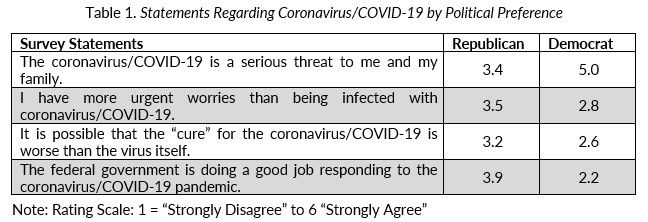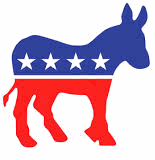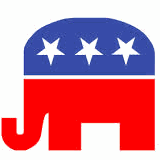The politicization of the trucking industry
The analytical backdrop for my additional analyses came from my realization that the public’s response and the object of blame for the COVID-19 pandemic is largely divided down political lines. For example, our data indicates that juror perceptions about the seriousness of COVID-19 and the government’s response to the pandemic differs depending on whether respondents were Republican or Democrat. As illustrated in the table below, self-identified Republicans are less concerned about the coronavirus and are more supportive of the government’s handling of the pandemic than self-identified Democrats.[1] Not surprisingly, individuals who indicated that they planned to vote for President Trump in the November 2020 presidential election also significantly differed in their responses to these statements compared to individuals who indicated that they did not plan to vote for President Trump.

These polarizing results led me to question whether a similar dichotomy exists regarding support for trucking companies following the COVID-19 pandemic. Surprisingly, I did not find any significant difference in support for the trucking industry and political affiliation. No difference existed between support for the trucking industry and intent to vote for President Trump in 2020 either. On average, all participants indicated that they were somewhere between having the same views toward the trucking industry or having somewhat more favorable opinions. However, our initial round of data collection was done in “judicial hellholes” (e.g., Los Angeles and Chicago) at the height of the pandemic. It is quite possible that these null findings may have been an artefact of the selected sample. Specifically, only 18% of respondents self-identified as Republican compared to 51% of respondents who self-identified as Democrat.
Following the death of George Floyd, the widespread Black Lives Matter (BLM) protests, and the “reopening” of many states, we began a second round of data collection in additional cities and states. We also added additional questionnaire items. This approach would allow us to capture new data from participants who may be seeing the world differently than they would have only a few weeks prior. Much like the first survey, we asked jurors to provide input into how much their perceptions of the trucking industry have changed as a result of COVID-19, their political affiliation, and whether they were planning to vote for President Trump in 2020. The second iteration of this survey also included questions regarding support for the recent BLM protests.
Analyzing the data from the second round of data collection bore out my initial suspicions. Respondents who self-identified as Republican (27% of respondents) had significantly more favorable opinions of the trucking industry than self-identified Democrats (32% of respondents). Individuals who indicated that they were going to vote for President Trump in 2020 (29% of respondents) also had significantly more favorable opinions of the trucking industry than respondents who indicated that they were not going to vote for President Trump (57% of respondents). Finally, respondents who indicated that they did not support the BLM protesters (28% of respondents) had significantly more favorable opinions of the trucking industry than respondents who indicated that they support the BLM protesters (72% of respondents).

Unfavorable opinion of trucking
Democrat
Anti-Trump
Supportive of BLM protesters

Favorable opinion of trucking
Republican
Pro-Trump
Unsupportive of BLM protesters
Figure 1. Comparing Favorability Ratings of the Trucking Industry across Political Affiliation, Support for President Trump, Support for the BLM Movement/Protesters, and Likelihood of Appearing for Jury Service
These results also highlight that a
premium must be placed on jury selection in trucking cases, post-COVID-19. Knowing
whether jurors are Republicans or Democrats will not automatically indicate
whether they are pro- or anti-trucking industry, however. On their own,
demographic variables are poor predictors of verdict orientation. Instead, attorneys
should consider the use of scientifically valid supplemental juror
questionnaires that will allow individuals to answer potentially sensitive questions
in a more truthful manner than asking the same questions in open court. These
questionnaires will also allow attorneys to elicit case-specific attitudinal
responses that can be used in conjunction with other information, including
demographics. Because, in the end, as everyone in the United States attempts to
navigate this “new normal,” attorneys and clients must ensure that they are
making data driven, research supported decisions, not ones based on hunches, gut
feelings, or anecdotal evidence.
[1] We also examined the strength of the association between political philosophy (1 = very liberal to 5 = very conservative) and ratings of the four statements listed in Table 1. As expected, the results looked similar to those when comparing Democrats and Republicans. Therefore, we are only focusing on the dichotomous Republican/Democrat variable for ease of understanding.